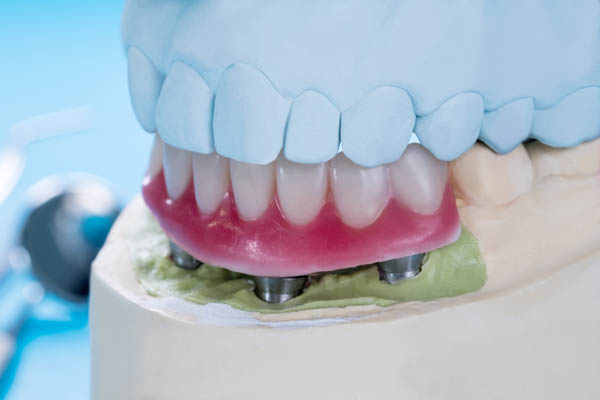Implant Supported Dentures vs. Conventional

Implant supported dentures give you a more comfortable experience than traditional dentures. These prosthetics combine the affordability of conventional dentures with the stability and bone preserving properties of implants.
Dentures are the most economical way to replace missing teeth, particularly when you have already lost most of your teeth. Their installation is non-invasive and the process can be completed in as little as two weeks.
Implants are the priciest way to replace missing teeth, but they also provide the most benefits. Implants are inserted into bone tissues in the jaw and they fuse with these tissues via osseointegration. This makes implants virtually as stable as real teeth, and they transfer bite forces into the jaw, keeping tissues there healthy and preventing the bone tissue loss that occurs when teeth fall out.
The price of implants rules them out as an option when a person has lost most of their teeth. A single implant can cost more than an entire set of dentures.
What to expect when getting implant-supported dentures
Many of those who opt for implant-supported dentures have already tried traditional dentures. Many of them seek a more stable alternative. Traditional dentures rest on the wearer’s gums and they are held in place via suction and dental adhesives. This is not enough to lead to a stable fit, so the prosthetic tends to shift in the mouth when worn.
This often leads to sores forming on soft tissues in the mouth. It can also make it challenging to speak or eat while wearing dentures. For some unfortunate souls, the poor stability of dentures can even lead to the prosthetic falling out while eating or speaking.
Eligibility
The installation of implants requires minor oral surgery. To be eligible for these prosthetics, patients should be healthy enough to recover from the stresses surgical treatments place on their bodies. Those with health conditions like diabetes or immune system disorders might not be eligible for implants. The same goes for people who take medications that can hinder blood clots.
Patients should be willing to give up habits like drinking and smoking before getting implants since these can also slow down the recovery process. Implants are placed in bone tissues in the jaw so patients need to have enough thickness there to hold implants in place. Bone grafts can be used to thicken the jaw of patients who have already lost bone tissues due to their teeth falling out.
The process
Getting implant-supported dentures often involves the dentists placing two to four implants on each half of the jaw being fitted. These implants are strategically placed in locations where the patient’s jawbone tissues are thickest. The implants are given up to six months to fuse with bone tissues around them. Attachments are fitted to the external-facing end of the implants and used to secure dentures in place.
Time for a better solution
Ready to replace your missing teeth? Give us a call or visit our Peabody clinic to learn more about implant-supported dentures.
Request an appointment here: https://crossstreetfamilydentistry.com or call Cross Street Family Dentistry at (978) 867-0190 for an appointment in our Peabody office.
Check out what others are saying about our dental services on Yelp: Implant Supported Dentures in Peabody, MA.
Related Posts
Dental restorative procedures like implant supported dentures can be a solution to partial or complete teeth loss. No one wants to lose a tooth, but you may experience it due to situations beyond control. In addition to transforming your smile, the procedure can boost your self-esteem and have your teeth functioning fully in no time.An…
Implant supported dentures are a popular tooth replacement treatment option that combines dental implants and dentures. Because they combine two already existing treatments, individuals tend to experience extremely positive results, meaning little to no failure and full functionality of the oral cavity. When considering implant-supported dentures, a popular question that arises is how long the procedure…
You have probably heard about dental implants and how this tooth-replacement option can restore your smile. Dentures are another treatment that patients with multiple missing teeth can benefit from. Your dentist can also combine the two by providing implant-supported dentures. There are reasons that this method offers advantages over traditional dentures.Both types of dentures come…
Let's cut to the root of the matter: wearing loose dentures is uncomfortable, dangerous, and often a source of embarrassment for their wearers - mainly when speaking or enjoying a meal. Many patients don't realize the potential long-term impact of wearing loose dentures or that they don't have to spend months or years dealing with ill-fitting…


